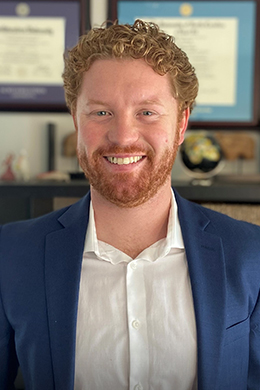Austin M. Evans
 Why did you choose Northwestern?
Why did you choose Northwestern?
I was drawn to Northwestern because of their world-class faculty, research, and facilities. As an undergraduate, I wasn't entirely sure what I wanted to spend my PhD researching but I knew that coming to Northwestern, the options were virtually limitless. Having completed my PhD, I can also say that Northwestern fosters a unique atmosphere where cross-disciplinary science and collaborative efforts thrive.
How would you describe your research and/or work to a non-academic audience? What was it then and/or what is it now?
Currently, virtually all plastics are comprised of one-dimensional polymer strands. While chemists are skilled at controlling the molecular-scale design of these chain-like polymeric materials, it is challenging to exert higher level structural control. As a graduate student, I found ways to create well-defined macromolecular sheets. This enhanced structural control makes these materials ideal for applications in filtration membranes, chemical sensors, or organic electronic devices. During my time at Northwestern I became interested in how electronic charges move through organic molecules and materials, which led me to my current position as a Schmidt Postdoctoral Fellow at Columbia University studying single-molecule electronics.
Tell us who or what inspired your research and/or work.
My PhD research drew inspiration from many areas including polymer, supramolecular, and organic chemistry. There is no shortage of inspiring scientists in these areas but I was particularly driven by the work of researchers such as Zhenan Bao (Stanford University), Sir J. Fraser Stoddart (Northwestern University), Luis Campos (Columbia University), and Seth Marder (University of Colorado).
I am also fortunate to be inspired by my extensive number of mentors. Specifically, I deeply admire my PhD adviser, Professor William Dichtel, who is a remarkable scientist, an engaging instructor, and an empathetic advisor. Beyond his scientific accomplishments, Will is also an outstanding steward for the polymer science community and a record-holding long-distance swimmer. I'm lucky to have such a well-rounded scientist as a role-model going-forward.
What are you most proud of in your career to date?
I am most proud of the extensive number of researchers (>300) I have worked with over the past several years. It has been a pleasure to explore such a broad range of science with these researchers but beyond that, I feel fortunate to have gotten the chance to meet and work with such a remarkable group of people. Undeniably, this is the best part of being a scientist.
Tell us about a current achievement or something you're working on that excites you.
I am deeply excited about the work in single-molecule electronics I am doing as a postdoctoral scholar that is specifically focused on organic radicals. In the longer term, I am excited to combine what I have learned as a postdoctoral scientist regarding single-molecules and apply that to the extended-type materials I studied as a PhD student.
What advice would you give your younger self or someone considering a similar path?
I think the surest path to success as a scientist is to study what you find to be genuinely interesting. Put another way, don't be afraid to break away from what others are doing, if you find something new exciting, trust your intuition.